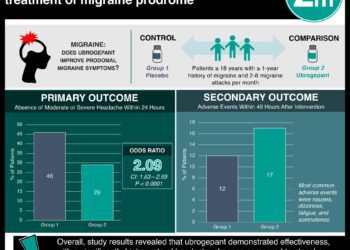Galcanezumab reduces the frequency of episodic cluster headaches
1. Patients with episode cluster headaches randomized to receive galcanezumab experienced a greater decline in frequency of headaches 1 to 3 weeks after treatment compared to placebo treated patients.
2. Injection-site pain occurred in patients receiving galcanezumab, though no notable differences in overall adverse events was seen between treatment and placebo groups.
Evidence Rating Level: 1 (Excellent)
Study Rundown: Episodic cluster headaches are a disabling condition that occurs in bouts separated by headache free periods. Reduced quality of life is associated with the headaches, affecting patient’s daily functioning, work, and mental health. Present treatment is aimed at reducing frequency of the attacks, though no medication is specifically approved for prevention the condition. The antibody galcanezumab, which binds and inhibits the calcitonin gene-related peptide (CGRP), has been effective for migraine treatment and its use for cluster headaches is of interest. The primary outcome of the study, reduction in headache frequency from weeks 1 to 3 of the study, showed a significantly higher reduction in galcanezumab treated patients compared to those treated with placebo. While those in the treatment group experienced a higher rate of injection site pain, no notable difference in adverse events was observed between the treatment groups.
This study provides supporting evidence for a first-in-class treatment for episodic cluster headaches by showing notable declines in headache frequency in treated patients, though the size of the trial and length of follow-up are both weaknesses that may limit the study’s impact.
Click to read the study in NEJM
Relevant Reading: A phase 3, long-term, open-label safety study of Galcanezumab in patients with migraine
In-Depth [randomized controlled trial]: This international, blinded, randomized controlled trial enrolled patients from 2015 to 2018. Eligible adult patients had a history of episode cluster headache and could distinguish a cluster headache from other headaches. Patients had to have headaches occurring at least once every other day and no more than 8 attaches per day during a 7-day enrollment period. Patients were allowed to continue use of treatments for active cluster headaches but could be on no type of preventative treatment. Patients were randomized to a galcanezumab (n=49) or placebo (n=57) group and given a subcutaneous injection at baseline and 1-month. Patients self-recorded information about the frequency and quality of their cluster headaches during the trial. The primary end point, mean reduction in cluster headaches through weeks 1 to 3 of the trial, was 8.7 in the treatment group compared to 5.2 in the placebo group (difference in mean change, 3.5 attacks per week; 95% confidence interval [CI], 0.2 to 6.7; P=0.04). In weeks 1 to 3, the mean reduction in weekly headaches was 52% in the treatment group compared to 27% in the placebo group. At week 3, the percent of patients that had at least a 50% reduction in headache frequency was 71% and 53% in the treatment and placebo groups, respectively (P=0.046). Adverse events occurred in 43% vs 33% of the treatment and placebo groups, respectively. Injection-site related pain occurred in 8% of the treatment group and in no placebo patients (P=0.04). No differences were observed in patient laboratory values, vital signs, or electrocardiographic variables.
Image: PD
©2019 2 Minute Medicine, Inc. All rights reserved. No works may be reproduced without expressed written consent from 2 Minute Medicine, Inc. Inquire about licensing here. No article should be construed as medical advice and is not intended as such by the authors or by 2 Minute Medicine, Inc






